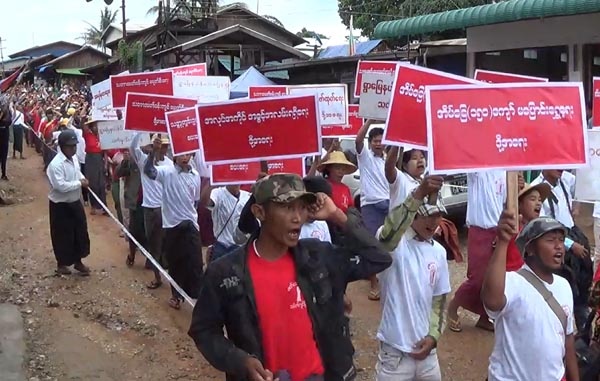Posts Tagged ‘EarthRights International’ (25 found)
Two New Briefers Expose Failings with Myanmar’s First Special Economic Zone
June 2 2015, Yangon, Myanmar — EarthRights International (ERI) found serious flaws relating to land rights, resettlement, and environmental protection in the planning and development of the Thilawa Special Economic Zone (SEZ) near Yangon, Myanmar. These flaws and their impacts on displaced communities and the surrounding environment are documented in two new briefers publicly released today […]
• • •Analysis of the Affected Communities’ Rights and Remedies Under Myanmar Law and JICA’s Guidelines
 EarthRights International (ERI) found serious flaws relating to land rights, resettlement, and environmental protection in the planning and development of the Thilawa Special Economic Zone (SEZ) near Yangon, Myanmar. These flaws and their impacts on displaced communities and the surrounding environment are documented in two new briefers […]
EarthRights International (ERI) found serious flaws relating to land rights, resettlement, and environmental protection in the planning and development of the Thilawa Special Economic Zone (SEZ) near Yangon, Myanmar. These flaws and their impacts on displaced communities and the surrounding environment are documented in two new briefers […]
Analysis of EIA for Phase I of Thilawa SEZ
 EarthRights International (ERI) found serious flaws relating to land rights, resettlement, and environmental protection in the planning and development of the Thilawa Special Economic Zone (SEZ) near Yangon, Myanmar. These flaws and their impacts on displaced communities and the surrounding environment are documented in two new briefers […]
EarthRights International (ERI) found serious flaws relating to land rights, resettlement, and environmental protection in the planning and development of the Thilawa Special Economic Zone (SEZ) near Yangon, Myanmar. These flaws and their impacts on displaced communities and the surrounding environment are documented in two new briefers […]
Over 1,000 in Mandalay Protest Mining Activities
 The mining sector in Burma continues to receive flak, with protestors taking to the streets in Wetthay and Phetshay villages in Thabeikkyin, Mandalay.
The mining sector in Burma continues to receive flak, with protestors taking to the streets in Wetthay and Phetshay villages in Thabeikkyin, Mandalay.
On 30 August, the villagers protested against the encroaching mining activities on village land and the displacement of more than 150 households. Aimed at gold mining companies such as Myanmar Golden Pwint, Shwe Pyi Thar and Htarwarra, along with other metal mining companies in the region, the protestors condemned the breaching of boundary lines by these companies and expanding mining activities onto legally recognized village land […]
• •First U.S. Companies Release Reports on Investments in Myanmar
A handful of U.S. companies released public reports on their investments in Myanmar last week, as required by the State Department and other agencies administering the U.S. sanctions regime. The reporting companies are involved in offshore oil and gas activities, as well as passive investments in a Singapore-based company doing significant business in Myanmar. More reports from U.S. companies, including from Coca-Cola, are expected towards the end of the year […]
• • •“There is No Benefit, They Destroyed our Farmland”
This periodic update is limited in scope to provide a snapshot of overall project development. However, other impacts have been documented along the pipeline route, including environmental harms, lack of local benefits, and human rights violations, including severe human impacts in northern Shan State […]
• • •U.S. State Department Must Hold U.S. Companies in Burma to International Standards
New investors in Burma should be required to publicly report on their human rights and environmental impacts, land acquisitions, security arrangements, and government payments – as well as those of their subsidiaries and business partners […]
• • •Rights Groups Express Strong Concern About Weak Requirements for U.S. Investment in Burma
After submitting a detailed comment to the U.S. Department of State expressing concern over weak reporting requirements for U.S. companies considering investing in Burma, EarthRights International, Freedom House, Physicians for Human Rights, U.S. Campaign for Burma and United to End Genocide issued the following statement […]
• • •Breaking: US Government Eases Sanctions on Burma
ERI concerned about risks for human rights, environment
ERI is greatly concerned by today’s announcement that the U.S. will issue General Licenses authorizing U.S. companies to do business in Burma without abiding by international best practices on human rights, environmental performance, and financial transparency. The construction of foreign-owned oil and gas pipelines continues to contribute to conflict and human rights abuses in ethnic minority areas such as Shan State, and companies investing in infrastructure development cause community suffering through forced displacement and environmental destruction throughout Burma […]
• • •Chevron Withers Under Criticism from Communities Suffering Human Rights and Environmental Harms
Yesterday at Chevron’s annual shareholder meeting, 22 indigenous, First Nation, and other impacted community members and supporters who had traveled to the company’s headquarters from locations around the globe and across the state confronted CEO John Watson with the brutal human and environmental abuses caused by the oil giants operations […]
• • •








 All posts
All posts